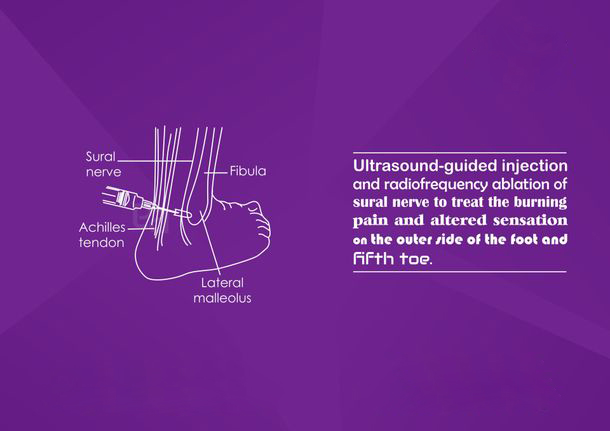

Treatments
HIP, KNEE & ANKLE PAIN

Sural Nerve Block
What is sural nerve block?
The sural nerve is a small, superficial nerve innervating the foot. Sural nerve supplies the backside of leg and the outer aspect of the foot and the heel. A sural nerve block is indicated in sural nerve entrapment where there is pain in the calf and in the outer part of the ankle and foot. It is also indicated in pain due to sural nerve injury. The nerve pain may present as burning or tingling sensation in the foot.
What should I expect during the procedure?
At Atlas Pain Care, Coimbatore, you will be asked to change into a hospital gown and taken to our procedure room. Your ankle will be cleaned with antiseptic solution and draped. The injection site is then identified using ultrasound or X-rays and a small amount of local anaesthetic is injected into the skin overlying the injection site to numb the skin. The medications are then given through a longer needle that has been positioned in the exact spot using ultrasound or X-ray guidance. You may feel some discomfort during the injection, but this normally settles quickly.
The whole procedure will take around about 15 minutes, and post procedure you will be observed in recovery room for 30 minutes and then discharged home. You may need to rest at home for the remainder of the day. But you should be able to resume your normal activities the next day. You might feel some numbness/weakness in your knee joint. But that should go away within a few hours.
When the pain relief is good, but short lived, a pulsed radiofrequency lesioning of the sural nerve could provide long-term benefit. In this procedure, an electric needle is guided under image-control to be positioned closer to the nerves, which are then gently stunned with the pulsed radiofrequency current.
What are the risks of the procedure?
As with most procedures, there is a remote risk of bleeding, infection, nerve injury or allergic reaction to the medications used. Injection site pain/soreness is the most common complication that is temporary.
Please read our FAQ section to know more about the do's and don'ts prior to and after the procedure.

